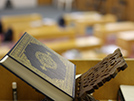Listening to GhiÄ«ba is also HarÄm
- Details
- Hits: 2358
Listening to GhiÄ«ba is also HarÄm
Lending ear to GhiÄ«ba is HarÄm just as uttering GhiÄ«ba is HarÄm. The Messenger of Allah (S) says,
“The one who listens to GhiÄ«ba is one of those who do GhiÄ«ba.”
(Mustadrak ul-Wasa’il)
He (S) also says,
“One who lends ear to back-biting is one of the back-biters.”
(Kashful Rabi)
Imam Sadiq (a.s.) says,
“GhiÄ«ba is equal to infidelity (One who does it is Kafir) and listening to and being pleased with it is like polytheism.”
(Mustadrak ul-Wasa’il)
Traditions that describe the respect due to believers, indicate that the honour of a Mu’min is more than the respect of Kaba. His dishonour is same as his murder. His exposure will bring upon the guilty severe chastisement. It is obvious that the main pillar of GhÄ«ba is the one who listens to backbiting. Because if the listener is not there or he refuses to listen to it, there is no GhiÄ«ba.
Therefore all Muslims are obliged not to hear the GhiÄ«ba of a believer. They must restrain the back biter so that the honour of the Mu’min is preserved. They should help the Mu’min in saving his honour.
The Messenger of Allah (S) says,
“If the GhiÄ«ba of ones believing brother is being done in ones presence and it is possible to defend him, one must defend him and Allah will help such a person in Hereafter. If in spite of being able he does not defend him, Allah will leave him on his own in the Hereafter and He shall not help him.”
(Al-Majalis)
He (S) has also said,
“If one defends his believer brother’s honour while back-biting is done about him in a way that he proves him faultless, Allah shall remove from him thousands of mischiefs from the world and the hereafter. But if he does not dispel them in spite of being able to do so, his sin shall be seventy times that of the back-biter.”
After quoting the above tradition, the Shaykh says that the sin of the listener is more than that of the back-biter because, but for him the back-biter would not have dared to back-bite. And listening to Ghiība mutely implies support of the back biter.
So if it is a worldly defect that is pointed out, he must say there is nothing of the sort. Faults are those which are described as faults by Allah (S.w.T.) and those that Allah (S.w.T.) has prohibited. So if you say anything that is not a fault in Allah (S.w.T.)’s view, it is not a GhiÄ«ba. The real mistake is the mention of this imaginary fault.
If the defect mentioned is according to religious law, one should try to absolve the Mu’min in whatever way possible. One can present a valid excuse for his actions or if this is not possible, one should draw the attention of the criticizer that after all a Mu’min is not infallible; if a Mu’min falls into sin we should pray for his forgiveness, instead of exposing and defaming him. We should also make him realize that his revelation can be more serious sin than the one committed by the Mu’min.
As a corollary to the discussion on what constitutes Ghiība according to the condition described, it is not obligatory to restrain the backbiter. At times it may happen that one may not be sure whether the criticism is of the permissible kind or not. In this case one should weigh the pros and cons of the situation. It is possible that the criticism is of the permissible type and by restraining the backbiter or by refuting his statements, we may do more harm, either to an individual or to a cause.











